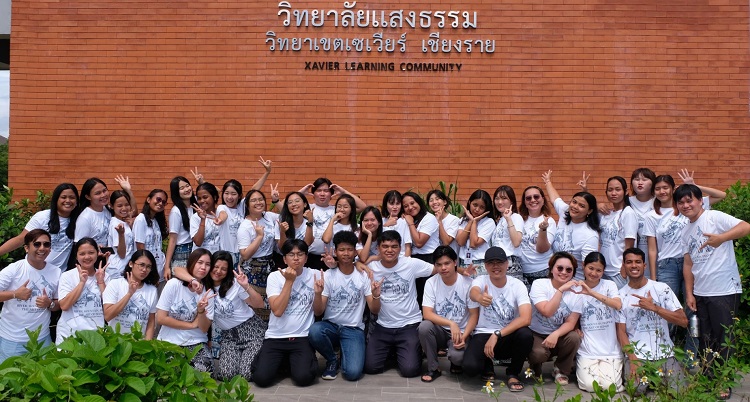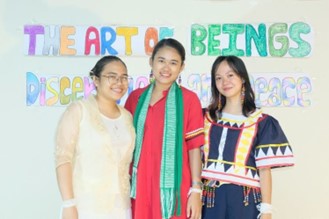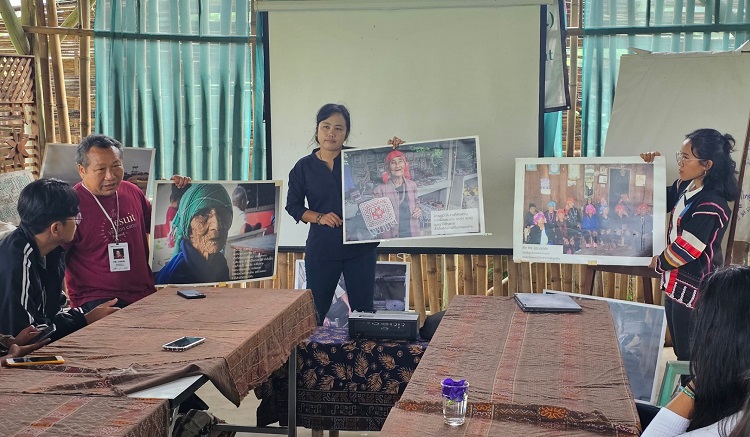
Delegates from the Xavier University Ateneo de Cagayan Service Learning Program (XU-SLP) participated in the 12th Association of Jesuit Colleges and Universities of the Asia-Pacific (AJCU- AP SLP) held in Chiang Rai, Thailand. This month-long service-learning program is aimed to foster international cooperation and strengthen the bonds of camaraderie and fellowship among students from seven Southeast Asian countries.
The AJCU-AP is a voluntary association of Jesuit higher educational institutions (HEIs) and Jesuit higher educational endeavors (HEEs) that supports and promotes Jesuit higher education in the Asia-Pacific region. The association also serves as a forum for the ongoing exchange of experience, information, and expertise among eight member institutions of which Xavier University- Ateneo de Cagayan (Xavier Ateneo) is a part of.
The Service-Learning Program (SLP) is one of the programs of the AJCU-AP. It was first started in 2008 by Xavier Ateneo involving AJCU-AP university members. It is a joint effort to implement Ignatian Pedagogy in the curriculum of AJCU-AP members and has become an annual hosting event among member institutions. This year, Xavier Learning Community of Saengtham College in Chiang Rai, Thailand has volunteered to host the program, under the leadership of the XLC school director, Fr. Vinai Boonlue, SJ. It is a residential institute that envisions itself as a culturally diverse institution for uplifting and empowering young people especially those coming from the ethnic groups in northern Thailand and neighboring countries.
In its twelfth iteration, with the theme “River, Mountain and People: The Art of Beings”, the AJCU-AP Service Learning Program was joined by participants from Indonesia's Sanata Dharma University, Thailand's Saengthem College Xavier Campus, Japan's Sophia University, Myanmar's
Campion Institute for English Language, Timor-Leste's Instituto São João de Brito, the University of Hong Kong, and the Philippines. Representing the Philippines were esteemed institutions including Ateneo de Manila University, Ateneo de Davao University, and Xavier University Ateneo de Cagayan.
The three-week program, which commenced on 8 August, concluded on 26 August 2023, providing students with a unique opportunity to engage in cross-cultural experiences and cultivate a sense of solidarity and goodwill for shared endeavors.
This year, through the Office of International Corporations and Networking (OICN), with the support of its director, Dr. Shiella C. Balbutin, and the director of XU’s Service Learning Program, Ms. Gail P. de la Rita, Xavier Ateneo delegation was represented by two exceptional SL students: Ms. Niecel Lou Bacayana, a senior BS Marine Biology student, and Ms. Brean Mei Walag, a senior BS Information Technology student. They were accompanied and supervised by Ms. Paulyn Erica M Porras, XU-XLP Formator.

The program encompassed a wide range of activities designed to facilitate an immersive learning experience, including workshops, educational excursions, cultural engagements, reflections, and processing sessions. These activities were meticulously curated to provide participants with insights into the communities of Northern Thailand, enhancing their understanding of diverse cultures and promoting the value of service. To have a peak of their immersive journey within the program, here is a collection of their reflective insights:
AJCU-AP SLP 2023: Exploring Development and Unity
Brean Mei Walag, 4th Year Information and Technology (Student Delegate)
“During the first week of the AJCU-AP SLP Immersion Program, the statement - ‘Development at the expense of others’ struck a chord with me. Originating from a Thai speaker near the Mekong
River, this concept resonated even more during a group reflection session. It aptly encapsulated the essence of my learnings throughout the first week.
The Mekong River serves as a natural boundary between Thailand, Laos, and Myanmar. Visiting the Golden Triangle vividly illustrated how a river can demarcate the territories of three distinct nations. This stark contrast was fascinating, especially for someone like me from the Philippines, an isolated archipelago. Witnessing countries in such close proximity was a revelation.
However, my excitement waned as I delved into the pressing issues surrounding the Mekong River. Thailand's push for development through agreements with China's Mekong River Dams had significant ecological and social repercussions. Central Thailand's prosperity starkly contrasted with the challenges faced by communities near the borders, highlighting the Thai government's uneven handling of its people's problems. The suppression of voices advocating for change added to the sadness.
I briefly considered the possibility of utilizing Thai universities for research and studies related to the river, but the harsh reality of government suppression and my limited understanding of the situation deterred me. I realized that my most potent contribution would be to raise awareness about the issues surrounding the Mekong River.
Another facet of development in Thailand's history was the opium trade. Thailand's fertile land once yielded a variety of crops, but the allure of opium's profitability led to its cultivation. This trade brought wealth but also suffering, addiction, and death to many. Reading testimonials from those affected by the opium trade left a lasting impression on me and drew parallels to the global drug situation today, where potent drugs pose a grave threat. Development isn't inherently negative, but decision-makers must weigh the consequences on various societal sectors. The concept of "unity" within the Thai government, with a monarchy at its core, stifled dissenting voices and concealed affairs from outsiders.

Acquiring Thai citizenship is a complex process with stringent criteria. Indigenous communities like the Akha and Karen, with unique practices and languages, struggled to meet these standards. As a result, many became "stateless," denied access to government services and benefits.
Volunteers from central Thailand are making efforts to educate these marginalized youths, offering hope for a better future. However, discrimination extends to migrant workers, who faced additional challenges during the COVID-19 pandemic.
These issues often remain hidden beneath Thailand's rapid development. To truly understand them, one must visit these communities and listen to their stories. I'm grateful to have learned about these issues, which aren't unique to Thailand but exist in various forms worldwide.
As the AJCU-AP SLP immersion program concluded, I felt a mix of emotions. The intensive final week included travels, exploration, and bonding moments. Highlights included exploring the Cave of Art at the White Temple and bonding with fellow delegates, as well as a homestay in a Karen village, where I connected with peers through late-night conversations. The stay at the National Youth Training Center offered opportunities to learn biking and trekking across farmlands. Despite the challenges, the experience was exhilarating, and the reward of delicious fried bananas and sweet potatoes made it worthwhile.
Returning to the Xavier Learning Community, I took time for reflection. This pause allowed me to appreciate the connections, memories, and lessons learned during this transformative journey. Though some connections remained unformed, I hope our paths will cross again. My time in Thailand with the AJCU-AP SLP Immersion Program was filled with valuable insights, personal growth, and meaningful connections.”
AJCU-AP SLP 2023: A Journey of Growth, Advocacy, and Global Awareness
Niecel Lou Bacayana, 4th year Marine Biology (Student Delegate)
“When I first learned about the AJCU-AP SLP 2023, I was immediately intrigued. However, I doubted I’d have the chance to participate because of my lack of prior conference experience. Still, my strong interest in learning about different cultures pushed me to take a shot at the interview. Admittedly, my inexperience left me uncertain about what to say to impress the selection committee. In the end, my friend was accepted while I landed on the waitlist, a result I had anticipated and accepted.
Upon arrival, I was apprehensive; I thought I might feel out of place. To my relief, everyone was welcoming and approachable, even though we arrived late. They briefed us on what had happened and what was to come. This marked the beginning of my AJCU experience, an experience I would wish for everyone to have. If I were to pinpoint the activities that left an impact on me, they would include the orientation with Fr. Tom Michel, SJ, the discussion with Mr. Niwat Roykaew, the visit to the Opium Hall, the learning session with the Hill Area and Community Development Foundation, the visit to Ban Lorcha, the session with the Aid Coordination Center for Migrant Workers, the interaction with the Lovely Garbage Band, and the historical discourse with Fr. Vinai Boonlue, SJ. All these experiences instilled in me a sense of responsibility as a citizen.
Growing up in a politically active family, I saw the positives and negatives of such involvement. I had been hesitant to engage in any political or advocacy activities because I knew that my actions would reflect on my family. However, firsthand exposure to these issues made me reevaluate my stance. I had initially believed that maintaining neutrality on the surface was the safest path. Still, I came to realize that it only silenced the voices of the marginalized. Kru Tee’s words deeply resonated with me when he emphasized that borders should not divide us because, after all, we are in the same world.

As I gradually return to my regular routine, the experience of this journey— the discussions, the people that I’ve met, the valuable lessons learned, and the pressing issues that were introduced— will forever be in my memory. The lingering sense of unease I feel serves as a motivator, driving me to strive for personal growth and become an advocate for the marginalized and for our earth.
As a student, I may not have immediate power and influence to help the marginalized communities, the rivers, or the mountains in Thailand, but I am determined to initiate change within my own community. I recognize that change starts within and then locally. No matter how small a change it may seem, as long as it's constant, the influence will gradually expand, reaching a wider audience.
In marine biology, they have instilled in me an understanding of the interconnectedness of our world, as seen in the balance of the ridge, river, and reef systems. The actions in the mountains can directly impact the rivers, which, in turn, have consequences that extend to the oceans. This interconnectedness reminds us that we are all bound together by an intricate web of relationships. Thus, I am driven by the belief that our collective efforts, no matter where they originate, can ripple and effect meaningful change, weaving us all together in our shared pursuit of a better world.”
From Chiang Rai to the Heart: My Odyssey with AJCU AP SLP 2023
Paulyn Erica M. Porras, SL Formator (Faculty Delegate)
“It has been a week since I returned home from my meaningful and fun-filled trip to Chiang Rai, Thailand, where I participated in the 12th AJCU-AP SLP 2023 as a formator companion for the student delegates, and I still can't put my beautiful memories to rest. Before fully immersing myself in the program, I was initially taken aback by concerns about my responsibilities at home and work that I might leave unattended. However, as I refocused myself, I came to appreciate the beauty of the 'here' and the 'now.' It's a profoundly different learning experience when you can detach yourself from a multitude of worries and concerns and concentrate your attention solely on the present moment while immersing yourself in a completely different culture. This allowed my mind to open up space to welcome diverse and complex ideas throughout the course of the program.
As a new and young formator in XU-SLP, this experience presented a valuable opportunity for personal growth and the enhancement of my skills in this role. It enabled me to cultivate greater self-awareness, as the program brought together individuals from diverse backgrounds, cultures, and life stories. Occasionally, when we encountered ideas that challenged our own truths or beliefs, it became evident how our pride and prejudices could obscure our understanding, much like my experience when trying to learn and understand Buddhism as part of the program's activities. Through these encounters, I learned the importance of remaining open-minded and self- reflective to genuinely connect with others and grow as an individual.
Facilitating spiritual conversations with participants coming from diverse cultural backgrounds was an extraordinary experience to me. The sharing and exchange of ideas was incredibly enriching, to the extent that I found myself worrying about my ability to effectively manage such a responsibility, especially considering my status as a new formator.
Yet, my initial worry swiftly transformed into wonder as I listened to each individual's unique reflection of their experience. I am profoundly thankful to the organizers who placed their trust in me for this role. This experience has undeniably been a significant catalyst for my growth as a formator.
As I journeyed from the river, the borders, up to the towering mountain peaks of Northern Thailand, I had the privilege of encountering a diverse group of people, each group living their lives in distinct ways. There were the river dwellers, whose resounding battle cries echoed with a deep commitment to restoring the ecological balance of the Mekong River, their lifeblood and
primary source of sustenance. Then, there were the tribal communities, often called the "Hill Tribe People" in northern Thailand, who faced an ongoing struggle for Thai citizenship recognition, marked by discrimination and neglect. Lastly, I met migrant workers from Laos and Myanmar, who displayed unwavering determination in their relentless pursuit of a brighter future.These diverse individuals, each with their unique way of life, share a common unfortunate reality – they are all victims of their own unjust systems. Nevertheless, they all find hope and resilience in the power of love and mutual service towards one another.
Meeting these people has raised a question in my mind: What can I do to help them? However, no matter how deeply I ponder this question, it leads me to one conclusion— as foreign delegates, we can only do so much. We can suggest numerous ideas and create action plans, but our capabilities have limitations. Nevertheless, we can bring our learning experiences back home and apply them as we look into our own communities and countries. That's when I began to think about the Philippines. I was reminded that our own citizens were also grappling with difficulties due to our unjust systems. Hence, using what we have learned and the skills we have acquired in this program to offer help and service to our fellow countrymen may be the best course of action to redirect this question.
The encounters, friendships, and connections I formed with my fellow delegates are treasures I wouldn't trade for anything in the world. As I got to know them on a deep level, hearing their unique ideas and stories in both the spiritual conversations and casual interactions, it felt like I was given a piece of their essence. The beauty of our unity, despite our diversity, was truly remarkable. This, I believe, is the essence of diversity – a tapestry of cultures and backgrounds woven together into a harmonious whole. The memories of people from various places and cultures coming together as one still bring a smile to my face. We were all bound together by our shared love for learning, service, and our fellow human beings. It was a powerful reminder that, no matter how different we may seem, at our core, we are all fundamentally the same as human beings.
Today, I just returned to the office after visiting one of XU-XLP's community partners. While sitting at my desk, a wave of nostalgia washed over me as I recalled my experiences in Chiang Rai and Chiang Mai, Thailand, and I couldn't help but reminisce as I looked at the faces of the people in the community. My AJCU AP SLP 2023 journey has been nothing short of a transformative experience. And as I press forward in my mission to serve the greater good and guide students along their path of striving to become people for others, rest assured, I shall carry these invaluable lessons with me, etching them deep into my heart and mind, as they have become the guiding stars of my future endeavors.
To all the people who are behind and with us on this beautiful journey, we are eternally grateful to all of you.”

It is worth noting that the inaugural AJCU-AP Service Learning Program was hosted by Xavier University Ateneo de Cagayan, which set the stage for subsequent editions and strengthened the university's dedication to international collaboration and the promotion of Jesuit values.
As the 12th AJCU-AP Service Learning Program concluded, participants were anticipated to return to their institutions with enriched perspectives, a stronger sense of global citizenship, and a steadfast commitment to service and solidarity. This program once again demonstrated the transformative potential of education, fostering meaningful connections among students from diverse backgrounds and transcending borders.